
Looking for a way to beautify your corner of the world? Want to elevate your mental health and benefit the environment? You will need to look no further for a hobby that is as simple as a flower garden when it comes to lightening up your outlook and contributing to the world around you. A great stress reliever and friend of both bees and butterflies, your flower garden can brighten up your lawn, porch, or balcony no matter where you live. Flower gardens can be planted in a lawn or container, giving you a reason to get up, get outside, and get a little fresh air. All it takes is a little know-how on how to fertilize a garden, and you are on your way to a blooming new hobby!
Why Fertilize Your Flower Garden?
The plants in your flower garden are going to work hard to produce brilliant blooms for you. Giving them extra nutrients provides the energy they need to keep the flowers bursting throughout the growing season. Many annuals and perennials will bloom year after year without any additional fertilizing or nutrients, but some need an extra boost. When planting on the lawn, some nutrients occur naturally and provide your flower garden with the food it needs to grow; fertilizing your garden gives it that “little something extra” to produce more blooms and remain healthy. When planting your flower garden in a container, the nutrients in the potting soil only last a short time and cannot be replenished by nature, as they are in the ground; the fertilizer provides the nutrients that can wash out over time.
What Should You Use to Fertilize Your Flower Garden?
The best way to fertilize a garden is with natural, organic materials. When looking for fertilizers, look for those with an N-P-K mixture – nitrogen, phosphorus, and potassium. Phosphorus is what your flower garden is looking for to provide you with stunning blooms, so look for a fertilizer with a higher phosphorus number (for example, 4-6-4). Higher nitrogen will generate more leafy growth, causing less flower production.
Typically, fertilizer comes in three forms:
-
Granular

- Liquid
- Compost
Granular fertilizer is often in pellet form and can be mixed directly into the soil where you plant your garden or into your plant container. This way of fertilizing a garden will keep providing nutrients for six to eight weeks; however, if there is excessive rain or watering during that time, the nutrients may be washed out faster.
Liquid fertilizers are easily used for fertilizing a garden, usually applied with a garden hose attachment to get directly to the soil or the flowering plants. As a topical application, the liquid fertilizer must soak into the ground to provide nutrients and may not be effective as long, requiring more frequent applications. Liquid fertilizers are great for a quick boost or as a supplement to slow-release fertilizer. Still, depending on how much time you want to spend with your flower garden, it may require you to pay more attention to fertilizing your garden than you would like!
Compost is an organic option for fertilizing a garden that can include peat moss, manure, leaf mold, bagged humus, and straw or bark mulch. Some of these can be high in nutrients and should be watched carefully, or they will cause imbalances in the soil. When using compost, it is advisable to check your soil for nutrient levels and adjust accordingly to keep your flower garden producing beautiful blooms.
How Often Should You Fertilize Your Flower Garden?

Fertilizing a garden is an activity you can set by a seasonal calendar. Whether you are starting a new flower garden or refreshing an existing one, spring is the time to focus on fertilization. If you are just getting started, springtime is best for getting outside and putting your hands in the soil. Spring is the perfect time to mix slow-release fertilizer into your soil to start your garden or to begin refreshing the soil you have in your existing yard or container flower garden. For slow-release, you will want to refresh your fertilizer two to three times before late summer. If you are using liquid fertilizer, you will apply it more frequently but still, stop fertilizing in late summer.
Important things to remember if using liquid fertilizer in the summer:
- Be sure to give the plant and soil a good drink before applying fertilizer; dehydrated plants absorb the fertilizer faster, which could damage the plant
- Applying liquid fertilizer to dry plants in direct sunlight can result in damage to the plant
- Pull back the mulch around the base of the plant to allow for air and absorption
There is no need to fertilize a garden during the fall or winter as the plants are dormant.
How Much Fertilizer Do I Use in My Flower Garden?
Less is more! A flower garden does not benefit from too much love. With any application, it is essential to read and follow the directions carefully. The exact amount will depend on if your flower garden is in a yard and how large the garden is, or if you are fertilizing a garden in a container and how large the container is.
Starting and maintaining a flower garden is easy once you establish a routine and rely on experts for great advice. If you have a lawn, a porch, or even a balcony, a flower garden can provide a bright spot in your life, allowing you to focus your effort and energy on a hobby that will continue to give back to you in beautiful blooms each year. With so many benefits to your health and the environment, a flower garden is a perfect way to add a splash of color to your life!











